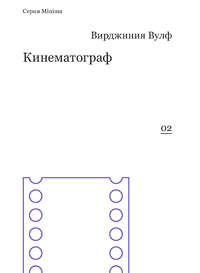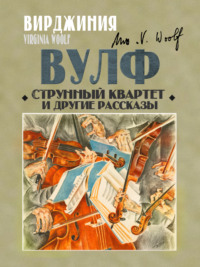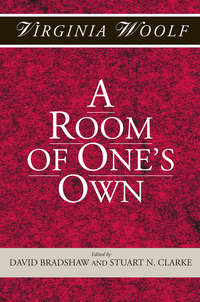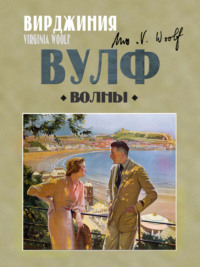 полная версия
полная версияJacob's Room
"Tut-tut!" said Mr. Bowley in his dressing-room an hour later. "Tut-tut!" – a comment that was profound enough, though inarticulately expressed, since his valet was handing his shirt studs.
Julia Eliot, too, had seen the horse run away, and had risen from her seat to watch the end of the incident, which, since she came of a sporting family, seemed to her slightly ridiculous. Sure enough the little man came pounding behind with his breeches dusty; looked thoroughly annoyed; and was being helped to mount by a policeman when Julia Eliot, with a sardonic smile, turned towards the Marble Arch on her errand of mercy. It was only to visit a sick old lady who had known her mother and perhaps the Duke of Wellington; for Julia shared the love of her sex for the distressed; liked to visit death-beds; threw slippers at weddings; received confidences by the dozen; knew more pedigrees than a scholar knows dates, and was one of the kindliest, most generous, least continent of women.
Yet five minutes after she had passed the statue of Achilles she had the rapt look of one brushing through crowds on a summer's afternoon, when the trees are rustling, the wheels churning yellow, and the tumult of the present seems like an elegy for past youth and past summers, and there rose in her mind a curious sadness, as if time and eternity showed through skirts and waistcoasts, and she saw people passing tragically to destruction. Yet, Heaven knows, Julia was no fool. A sharper woman at a bargain did not exist. She was always punctual. The watch on her wrist gave her twelve minutes and a half in which to reach Bruton Street. Lady Congreve expected her at five.
The gilt clock at Verrey's was striking five.
Florinda looked at it with a dull expression, like an animal. She looked at the clock; looked at the door; looked at the long glass opposite; disposed her cloak; drew closer to the table, for she was pregnant – no doubt about it, Mother Stuart said, recommending remedies, consulting friends; sunk, caught by the heel, as she tripped so lightly over the surface.
Her tumbler of pinkish sweet stuff was set down by the waiter; and she sucked, through a straw, her eyes on the looking-glass, on the door, now soothed by the sweet taste. When Nick Bramham came in it was plain, even to the young Swiss waiter, that there was a bargain between them. Nick hitched his clothes together clumsily; ran his fingers through his hair; sat down, to an ordeal, nervously. She looked at him; and set off laughing; laughed – laughed – laughed. The young Swiss waiter, standing with crossed legs by the pillar, laughed too.
The door opened; in came the roar of Regent Street, the roar of traffic, impersonal, unpitying; and sunshine grained with dirt. The Swiss waiter must see to the newcomers. Bramham lifted his glass.
"He's like Jacob," said Florinda, looking at the newcomer.
"The way he stares." She stopped laughing.
Jacob, leaning forward, drew a plan of the Parthenon in the dust in Hyde Park, a network of strokes at least, which may have been the Parthenon, or again a mathematical diagram. And why was the pebble so emphatically ground in at the corner? It was not to count his notes that he took out a wad of papers and read a long flowing letter which Sandra had written two days ago at Milton Dower House with his book before her and in her mind the memory of something said or attempted, some moment in the dark on the road to the Acropolis which (such was her creed) mattered for ever.
"He is," she mused, "like that man in Moliere."
She meant Alceste. She meant that he was severe. She meant that she could deceive him.
"Or could I not?" she thought, putting the poems of Donne back in the bookcase. "Jacob," she went on, going to the window and looking over the spotted flower-beds across the grass where the piebald cows grazed under beech trees, "Jacob would be shocked."
The perambulator was going through the little gate in the railing. She kissed her hand; directed by the nurse, Jimmy waved his.
"HE'S a small boy," she said, thinking of Jacob.
And yet – Alceste?
"What a nuisance you are!" Jacob grumbled, stretching out first one leg and then the other and feeling in each trouser-pocket for his chair ticket.
"I expect the sheep have eaten it," he said. "Why do you keep sheep?"
"Sorry to disturb you, sir," said the ticket-collector, his hand deep in the enormous pouch of pence.
"Well, I hope they pay you for it," said Jacob. "There you are. No. You can stick to it. Go and get drunk."
He had parted with half-a-crown, tolerantly, compassionately, with considerable contempt for his species.
Even now poor Fanny Elmer was dealing, as she walked along the Strand, in her incompetent way with this very careless, indifferent, sublime manner he had of talking to railway guards or porters; or Mrs. Whitehorn, when she consulted him about her little boy who was beaten by the schoolmaster.
Sustained entirely upon picture post cards for the past two months, Fanny's idea of Jacob was more statuesque, noble, and eyeless than ever. To reinforce her vision she had taken to visiting the British Museum, where, keeping her eyes downcast until she was alongside of the battered Ulysses, she opened them and got a fresh shock of Jacob's presence, enough to last her half a day. But this was wearing thin. And she wrote now – poems, letters that were never posted, saw his face in advertisements on hoardings, and would cross the road to let the barrel-organ turn her musings to rhapsody. But at breakfast (she shared rooms with a teacher), when the butter was smeared about the plate, and the prongs of the forks were clotted with old egg yolk, she revised these visions violently; was, in truth, very cross; was losing her complexion, as Margery Jackson told her, bringing the whole thing down (as she laced her stout boots) to a level of mother-wit, vulgarity, and sentiment, for she had loved too; and been a fool.
"One's godmothers ought to have told one," said Fanny, looking in at the window of Bacon, the mapseller, in the Strand – told one that it is no use making a fuss; this is life, they should have said, as Fanny said it now, looking at the large yellow globe marked with steamship lines.
"This is life. This is life," said Fanny.
"A very hard face," thought Miss Barrett, on the other side of the glass, buying maps of the Syrian desert and waiting impatiently to be served. "Girls look old so soon nowadays."
The equator swam behind tears.
"Piccadilly?" Fanny asked the conductor of the omnibus, and climbed to the top. After all, he would, he must, come back to her.
But Jacob might have been thinking of Rome; of architecture; of jurisprudence; as he sat under the plane tree in Hyde Park.
The omnibus stopped outside Charing Cross; and behind it were clogged omnibuses, vans, motor-cars, for a procession with banners was passing down Whitehall, and elderly people were stiffly descending from between the paws of the slippery lions, where they had been testifying to their faith, singing lustily, raising their eyes from their music to look into the sky, and still their eyes were on the sky as they marched behind the gold letters of their creed.
The traffic stopped, and the sun, no longer sprayed out by the breeze, became almost too hot. But the procession passed; the banners glittered – far away down Whitehall; the traffic was released; lurched on; spun to a smooth continuous uproar; swerving round the curve of Cockspur Street; and sweeping past Government offices and equestrian statues down Whitehall to the prickly spires, the tethered grey fleet of masonry, and the large white clock of Westminster.
Five strokes Big Ben intoned; Nelson received the salute. The wires of the Admiralty shivered with some far-away communication. A voice kept remarking that Prime Ministers and Viceroys spoke in the Reichstag; entered Lahore; said that the Emperor travelled; in Milan they rioted; said there were rumours in Vienna; said that the Ambassador at Constantinople had audience with the Sultan; the fleet was at Gibraltar. The voice continued, imprinting on the faces of the clerks in Whitehall (Timothy Durrant was one of them) something of its own inexorable gravity, as they listened, deciphered, wrote down. Papers accumulated, inscribed with the utterances of Kaisers, the statistics of ricefields, the growling of hundreds of work-people, plotting sedition in back streets, or gathering in the Calcutta bazaars, or mustering their forces in the uplands of Albania, where the hills are sand-coloured, and bones lie unburied.
The voice spoke plainly in the square quiet room with heavy tables, where one elderly man made notes on the margin of typewritten sheets, his silver-topped umbrella leaning against the bookcase.
His head – bald, red-veined, hollow-looking – represented all the heads in the building. His head, with the amiable pale eyes, carried the burden of knowledge across the street; laid it before his colleagues, who came equally burdened; and then the sixteen gentlemen, lifting their pens or turning perhaps rather wearily in their chairs, decreed that the course of history should shape itself this way or that way, being manfully determined, as their faces showed, to impose some coherency upon Rajahs and Kaisers and the muttering in bazaars, the secret gatherings, plainly visible in Whitehall, of kilted peasants in Albanian uplands; to control the course of events.
Pitt and Chatham, Burke and Gladstone looked from side to side with fixed marble eyes and an air of immortal quiescence which perhaps the living may have envied, the air being full of whistling and concussions, as the procession with its banners passed down Whitehall. Moreover, some were troubled with dyspepsia; one had at that very moment cracked the glass of his spectacles; another spoke in Glasgow to-morrow; altogether they looked too red, fat, pale or lean, to be dealing, as the marble heads had dealt, with the course of history.
Timmy Durrant in his little room in the Admiralty, going to consult a Blue book, stopped for a moment by the window and observed the placard tied round the lamp-post.
Miss Thomas, one of the typists, said to her friend that if the Cabinet was going to sit much longer she should miss her boy outside the Gaiety.
Timmy Durrant, returning with his Blue book under his arm, noticed a little knot of people at the street corner; conglomerated as though one of them knew something; and the others, pressing round him, looked up, looked down, looked along the street. What was it that he knew?
Timothy, placing the Blue book before him, studied a paper sent round by the Treasury for information. Mr. Crawley, his fellow-clerk, impaled a letter on a skewer.
Jacob rose from his chair in Hyde Park, tore his ticket to pieces, and walked away.
"Such a sunset," wrote Mrs. Flanders in her letter to Archer at Singapore. "One couldn't make up one's mind to come indoors," she wrote.
"It seemed wicked to waste even a moment."
The long windows of Kensington Palace flushed fiery rose as Jacob walked away; a flock of wild duck flew over the Serpentine; and the trees were stood against the sky, blackly, magnificently.
"Jacob," wrote Mrs. Flanders, with the red light on her page, "is hard at work after his delightful journey…"
"The Kaiser," the far-away voice remarked in Whitehall, "received me in audience."
"Now I know that face – " said the Reverend Andrew Floyd, coming out of Carter's shop in Piccadilly, "but who the dickens – ?" and he watched Jacob, turned round to look at him, but could not be sure —
"Oh, Jacob Flanders!" he remembered in a flash.
But he was so tall; so unconscious; such a fine young fellow.
"I gave him Byron's works," Andrew Floyd mused, and started forward, as Jacob crossed the road; but hesitated, and let the moment pass, and lost the opportunity.
Another procession, without banners, was blocking Long Acre. Carriages, with dowagers in amethyst and gentlemen spotted with carnations, intercepted cabs and motor-cars turned in the opposite direction, in which jaded men in white waistcoats lolled, on their way home to shrubberies and billiard-rooms in Putney and Wimbledon.
Two barrel-organs played by the kerb, and horses coming out of Aldridge's with white labels on their buttocks straddled across the road and were smartly jerked back.
Mrs. Durrant, sitting with Mr. Wortley in a motor-car, was impatient lest they should miss the overture.
But Mr. Wortley, always urbane, always in time for the overture, buttoned his gloves, and admired Miss Clara.
"A shame to spend such a night in the theatre!" said Mrs. Durrant, seeing all the windows of the coachmakers in Long Acre ablaze.
"Think of your moors!" said Mr. Wortley to Clara.
"Ah! but Clara likes this better," Mrs. Durrant laughed.
"I don't know – really," said Clara, looking at the blazing windows. She started.
She saw Jacob.
"Who?" asked Mrs. Durrant sharply, leaning forward.
But she saw no one.
Under the arch of the Opera House large faces and lean ones, the powdered and the hairy, all alike were red in the sunset; and, quickened by the great hanging lamps with their repressed primrose lights, by the tramp, and the scarlet, and the pompous ceremony, some ladies looked for a moment into steaming bedrooms near by, where women with loose hair leaned out of windows, where girls – where children – (the long mirrors held the ladies suspended) but one must follow; one must not block the way.
Clara's moors were fine enough. The Phoenicians slept under their piled grey rocks; the chimneys of the old mines pointed starkly; early moths blurred the heather-bells; cartwheels could be heard grinding on the road far beneath; and the suck and sighing of the waves sounded gently, persistently, for ever.
Shading her eyes with her hand Mrs. Pascoe stood in her cabbage-garden looking out to sea. Two steamers and a sailing-ship crossed each other; passed each other; and in the bay the gulls kept alighting on a log, rising high, returning again to the log, while some rode in upon the waves and stood on the rim of the water until the moon blanched all to whiteness.
Mrs. Pascoe had gone indoors long ago.
But the red light was on the columns of the Parthenon, and the Greek women who were knitting their stockings and sometimes crying to a child to come and have the insects picked from its head were as jolly as sand-martins in the heat, quarrelling, scolding, suckling their babies, until the ships in the Piraeus fired their guns.
The sound spread itself flat, and then went tunnelling its way with fitful explosions among the channels of the islands.
Darkness drops like a knife over Greece.
"The guns?" said Betty Flanders, half asleep, getting out of bed and going to the window, which was decorated with a fringe of dark leaves.
"Not at this distance," she thought. "It is the sea."
Again, far away, she heard the dull sound, as if nocturnal women were beating great carpets. There was Morty lost, and Seabrook dead; her sons fighting for their country. But were the chickens safe? Was that some one moving downstairs? Rebecca with the toothache? No. The nocturnal women were beating great carpets. Her hens shifted slightly on their perches.
CHAPTER FOURTEEN
"He left everything just as it was," Bonamy marvelled. "Nothing arranged. All his letters strewn about for any one to read. What did he expect? Did he think he would come back?" he mused, standing in the middle of Jacob's room.
The eighteenth century has its distinction. These houses were built, say, a hundred and fifty years ago. The rooms are shapely, the ceilings high; over the doorways a rose or a ram's skull is carved in the wood. Even the panels, painted in raspberry-coloured paint, have their distinction.
Bonamy took up a bill for a hunting-crop.
"That seems to be paid," he said.
There were Sandra's letters.
Mrs. Durrant was taking a party to Greenwich.
Lady Rocksbier hoped for the pleasure…
Listless is the air in an empty room, just swelling the curtain; the flowers in the jar shift. One fibre in the wicker arm-chair creaks, though no one sits there.
Bonamy crossed to the window. Pickford's van swung down the street. The omnibuses were locked together at Mudie's corner. Engines throbbed, and carters, jamming the brakes down, pulled their horses sharp up. A harsh and unhappy voice cried something unintelligible. And then suddenly all the leaves seemed to raise themselves.
"Jacob! Jacob!" cried Bonamy, standing by the window. The leaves sank down again.
"Such confusion everywhere!" exclaimed Betty Flanders, bursting open the bedroom door.
Bonamy turned away from the window.
"What am I to do with these, Mr. Bonamy?"
She held out a pair of Jacob's old shoes.









